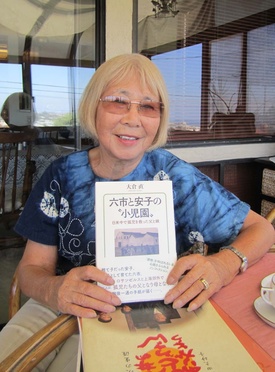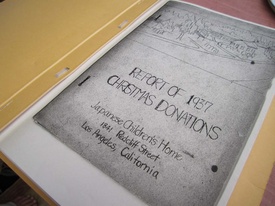A former "children's garden" in Los Angeles
In September 2017, the Southern California Oita Kenjinkai, to which I belong, held a grand 100th anniversary ceremony in the suburbs of Los Angeles, bringing together nearly 100 participants. One of the special guests at the ceremony was a woman named Miko Henson. She is not from Oita Prefecture. She was the woman who worked hard to turn the book "Rokuichi and Yasuko's Children's Garden," which had just been published in Japan that year, into a book. The hometown of Kusumoto Rokuichi was Usa City, Oita Prefecture.
Before the war, Rokuichi ran a kindergarten in Los Angeles that took in and cared for orphans. I was very interested, but I was so busy that time passed since the memorial ceremony. Then, in September 2018, Jean Aida, president of the Oita Prefectural Association, forwarded me an email from Henson saying that she wanted to give me the book. I was very grateful for this, so I visited Henson's home on Wednesday of the week I received the email and finished reading "Rokuichi and Yasuko's Kindergarten" that same day.
Rokuichi left Kyushu for Osaka and worked at a facility for orphaned children called Hakuaisha. He came up with the idea of building a farm so that the children could work when they had to leave the facility. Moreover, he looked for land overseas, not in Japan. After traveling to Vancouver and Seattle in Canada, and then back and forth between Japan several times, he settled in Los Angeles. However, he discovered that many Japanese children in Los Angeles had been abandoned by their parents and had nowhere to go.
The one that moved Rokuichi the most was a young girl whose fingers had lost their shape due to burns. Rokuichi met her after she had been mistreated by a Mexican family in her care, where her Japanese father had placed her. He took her in as his own daughter and named her Yasuko.
Rokuichi first opened the Southern California Children's Garden in Inglewood, a suburb south of Los Angeles. He never called the children who could not live with their biological parents "orphans," but insisted on calling them "children's gardens." He then moved to Silver Lake, where he lived with the children as if they were his family.
Recognized and supported by the Japanese community
In 2007, Henson was involved in the Los Angeles screening of "Thank You, Ishii's Dad," a film about an orphanage in Okayama. He learned about Rokuichi and the kindergarten when someone who saw the film told him, "There was a man like Ishii's dad in Los Angeles, too." The more he learned about it, the more he wondered why that history was not being talked about in the local Japanese community today, and the more he wanted to let people today know about a man like Ishii, what he did, and the kindergarten he ran for children, so he continued to collect information. He also visited Usa City, where Rokuichi was born. He then asked Nao Okura, who writes biographies of people hidden in the shadows of history (Okura also wrote "The Miracle School," a biography of Shiro Arimoto, Henson's real father and founder of Shibaura Institute of Technology), to write the book, and three years later, the book was published in 2017.
As Okura writes in the afterword, "Arimoto-san (Henson's maiden name) is like a co-author to me," and without Henson's similar obsession that "Kusumoto Rokuichi should not be lost to history," the book would never have been made.
Rokuichi himself also had the habit of working steadily and without giving up. One of the important documents that Henson keeps is a booklet with a cover titled "1937 Donation Report." The mimeographed booklet is filled with pages of meticulous handwriting, listing the people who donated to the kindergarten and the amounts they donated. The amount per person is not large. However, it feels like the booklet is filled with the goodwill of hundreds of people.
The book also includes the recollections of Mitsuru Yamazaki, a former student of the kindergarten who is now in his 90s and still lives near Los Angeles. According to him, when Mitsuru and Rokuichi went out to the Japanese town in his truck, food was thrown into the back of the truck one after another. This shows how well the kindergarten was recognized and supported by the community.
The words of someone who knows them both touch my heart.
As she grew up, Yasuko ran a children's garden in China, working devotedly for Chinese orphans. Rokuichi returned to Japan by ship during the war, but died of illness before the end of the war. Yasuko married a man from Akita and lived in Usa, where her adoptive father Rokuichi was born, for a while, but returned to America with her husband and children. Once again, she continued to work hard to help those in need. Yasuko's three children still live in California and Nevada.
The most moving parts of this book are the recollections of Mitsuru, who lived at the kindergarten, and the passages where Yasuko's children talk about their mother's character. The words of someone who actually saw and knew the truth really pierce the heart. I would like to express my respect to the author, Okura, who collected these precious testimonies and compiled them into a book, and to Henson, who worked hard to make it into a book.
A few years ago, the sale of a nursing home for Japanese Americans to a private company became big news in the Japanese community of Los Angeles. The founder of the home, Fred Wada, also appears in "Rokuichi and Yasuko." When he founded the home, hoping to create a place where Japanese retired people could live in peace, he surely never imagined that the home would end up being sold to a private company. This book is also important in that it reminds us of the goodwill that certainly existed in the Japanese community in the past.
Nao Okura, "Rokuichi and Yasuko's Children's Garden: The Father and Daughter Who Saved Orphans in Japan, the United States, and China" (Gendaishokan, 2017)
© 2018 Keiko Fukuda







